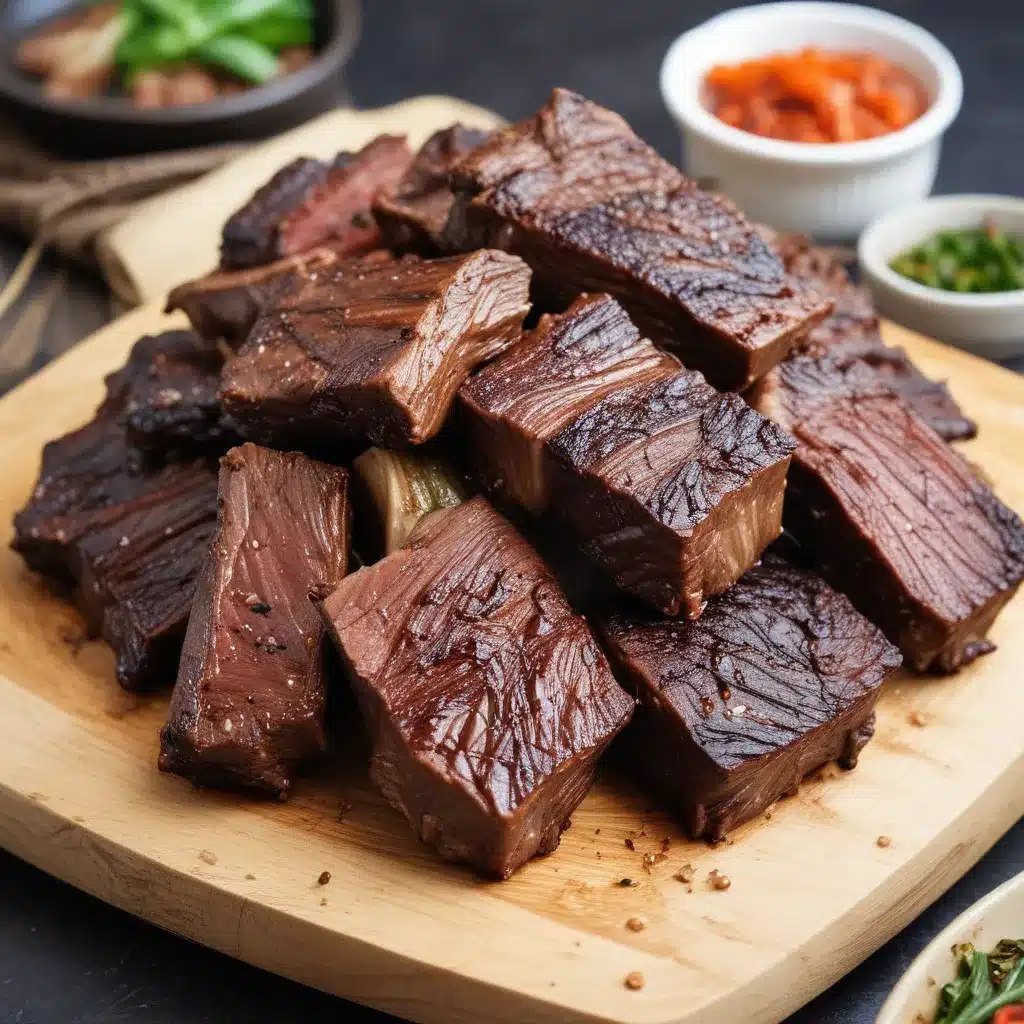
Discovering the Delightful Depths of Galbi
As I step into the bustling world of Korean cuisine in Boston, the aromas of sizzling meat and charred onions immediately captivate my senses. But it is the galbi, the Korean-style short ribs, that truly hold me in their thrall. These succulent, caramelized morsels have become a culinary beacon, drawing in food enthusiasts from near and far to experience the depths of their flavor.
From the moment I first sank my teeth into the tender, juicy galbi, I knew I had embarked on a flavor odyssey. The perfect balance of sweet and savory, the meat’s intoxicating aroma, and the satisfying texture had me hooked. And as I delved deeper into the world of this iconic Korean dish, I discovered a rich tapestry of history, tradition, and culinary innovation that continues to captivate me.
Exploring the Origins and Evolution of Galbi
To truly understand the allure of galbi, one must first explore its origins. The word “galbi” is derived from the Korean words “gal,” meaning rib, and “bi,” meaning meat. This humble dish has its roots in the royal kitchens of the Joseon dynasty, where it was meticulously prepared and served to the noble class.
As I ponder the history of galbi, I can’t help but imagine the intricate dance of flavors that must have graced the palates of the Joseon aristocracy. The perfect balance of sweet, savory, and umami was surely the result of a centuries-old culinary tradition, honed and refined over generations.
But the story of galbi doesn’t end there. Over time, this regal dish has undergone a remarkable transformation, evolving to cater to the diverse tastes and preferences of the modern palate. Today, the galbi you’ll find in Boston’s vibrant Korean food scene is a testament to the resilience and adaptability of this iconic dish.
Mastering the Art of Galbi Preparation
The true magic of galbi lies in its preparation. It’s a process that demands precision, patience, and a deep understanding of the interplay between ingredients. As I delve into the nuances of this culinary art, I’m struck by the intricacy of the steps involved.
First, the short ribs are meticulously trimmed, the excess fat carefully removed to create the perfect balance of tenderness and bite. Then, the meat is marinated in a captivating blend of soy sauce, brown sugar, garlic, and a symphony of other aromatics – each element playing a vital role in the final flavor profile.
The true test, however, comes in the grilling. As the meat sizzles over the open flame, the sugars in the marinade caramelize, creating a delectable char that seduces the senses. The skilled galbi chef must maintain a keen eye, adjusting the heat and flip frequency to ensure each morsel is cooked to perfection.
But the story doesn’t end there. The presentation of galbi is an art form in itself, with the perfectly arranged short ribs often accompanied by a array of banchan, or Korean side dishes, that provide a harmonious counterpoint to the rich, savory flavors.
Savoring the Flavors of Galbi in Boston
As I explore the Korean food scene in Boston, I’m delighted to discover a diverse array of establishments that have elevated the art of galbi to new heights. From the traditional, family-owned eateries to the modern, innovative restaurants, each offers its own unique interpretation of this beloved dish.
One particularly memorable experience was at Korean Garden Boston, where I had the privilege of indulging in their signature galbi. The moment the sizzling platter arrived at my table, the air was filled with the intoxicating aroma of caramelized meat and aromatic spices. As I took my first bite, the flavors exploded on my palate – the perfect balance of sweetness, saltiness, and a subtle hint of char that lingered delightfully.
But the true joy of galbi lies not just in the flavors, but in the entire dining experience. At Korean Garden Boston, I was captivated by the lively atmosphere, the skilled tableside cooking, and the opportunity to engage with the knowledgeable staff. It was a true celebration of Korean culture and cuisine, one that left an indelible mark on my culinary journey.
Galbi: A Culinary Legacy to Cherish
As I reflect on my explorations of galbi in Boston, I can’t help but feel a deep appreciation for the rich history and cultural significance of this iconic dish. It’s a testament to the ingenuity and passion of Korean culinary masters, who have masterfully blended tradition with innovation to create a truly unforgettable gastronomic experience.
In a city as diverse and vibrant as Boston, the presence of galbi serves as a cultural bridge, inviting food enthusiasts to immerse themselves in the depths of Korean cuisine. And as I continue to savor the flavors and uncover the stories behind this captivating dish, I know that my journey has only just begun.
So, if you find yourself in Boston, I urge you to embark on your own galbi odyssey. Seek out the hidden gems, the family-owned eateries, and the cutting-edge restaurants that are keeping the legacy of this beloved dish alive. For in doing so, you’ll not only satisfy your taste buds, but you’ll also uncover a world of culinary wonder and cultural exploration.
